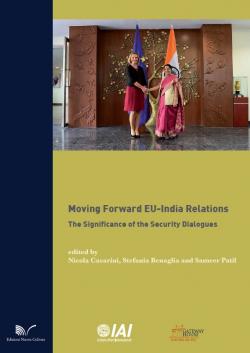Moving Forward EU-India Relations. The Significance of the Security Dialogues
Negli ultimi due decenni è aumentata la quantità e la qualità delle relazioni Unione europea-India. Accanto alla dimensione economica, gli aspetti politici e di sicurezza della relazione si sono affermati come l’area più promettente per una maggiore collaborazione tra le due parti. Questo volume riunisce analisi e raccomandazioni sulle relazioni di sicurezza UE-India nei seguenti settori: (i) sicurezza marittima e libertà di navigazione; (ii) sicurezza informatica e protezione dei dati; (iii) politica spaziale e satellitare; (iv) cooperazione di difesa. I capitoli sono stati scritti da un selezionato gruppo di esperti europei e indiani su richiesta dall’Istituto Affari Internazionali (IAI) di Roma e del Gateway House (GH) di Mumbai nell’ambito della EU-India Think Tank Twinning Initiative – un progetto di diplomazia pubblica finanziato dall’Unione europea e destinato a collegare gli istituti di ricerca europei e indiani. Il volume fornisce al lettore ricerche originali e approfondimenti innovativi su come far progredire le relazioni UE-India e sarà una lettura essenziale per gli studiosi e i politici interessati al tema.
Risultato del progetto “Moving Forward the EU-India Security Dialogue: Traditional and Emerging Issues” condotto dall’Istituto Affari Internazionali (IAI) in collaborazione con Gateway House: Indian Council on Global Relations (GH). Il progetto è parte della EU-India Think Tank Twinning Initiative finanziata dall’Unione europea. Raccolta di documenti pubblicati in precedenza da IAI (cap. 1, 4-5, 8-9) e Gateway House (cap. 2-3, 6-7).
Abstracts, p. 9-14
Introduction, p. 15-20
1. Maritime Security and Freedom of Navigation from the South China Sea and Indian Ocean to the Mediterranean: Potential and Limits of EU-India Cooperation, by Nicola Casarini, p. 21-38
1.1 Europe’s maritime strategy
1.2 India’s maritime strategy
1.3 China’s new Maritime Silk Road: Implications for the EU and India
1.4 European and Indian perspectives on evolving security dynamics in the South China Sea
1.5 The maritime balance of power in the Indo-Pacific
1.6 Old and new multilateral security frameworks
2. Maritime Security and Freedom of Navigation from the South China Sea and Indian Ocean to the Mediterranean, by Vice Admiral Anil Chopra, p. 39-47
2.1 Maritime security
2.2 The Indo-Pacific
2.3 The EU and the Indo-Pacific
2.4 India’s maritime perspective
2.5 China and the Indian Ocean Region
2.6 India-EU maritime cooperation
3. India-EU Cooperation on Cyber Security and Data Protection, by Sameer Patil, Purvaja Modak, Kunal Kulkarni and Aditya Phatak, p. 47-76
3.1 Multiple cyber security challenges
3.1.1 Cyber threats from non-state actors
3.2 Opportunities for India-EU cyber security cooperation
3.3 Impact of EU’s dual-use regime on cyber security cooperation
3.4 Data protection issues impinging on India-EU ties
3.5 Policy recommendations for India-EU cyber security cooperation
Conclusion
4. EU-India Cooperation on Cyber Issues: Towards Pragmatic Idealism?, by Patryk Pawlak, p. 77-89
4.1 The EU and cyber diplomacy: A forward-looking player?
4.2 Incredible India: More than a slogan
4.3 India’s cyber policies: A swing state?
4.3.1 Multi-stakeholder approach and accountability
4.3.2 Sovereignty in cyberspace
4.3.3 Protection of human rights online
4.4 Understanding the limits of EU-India cooperation
4.4.1 Guilty by association
4.4.2 Principles-policy gap
4.5 A “pragmatic idealism” through network diplomacy
5. EU-India Cooperation on Space and Security, by Isabelle Sourbès-Verger, p. 91-108
5.1 The prominent role of cooperation in building the space capabilities of India and Europe
5.2 The use of satellites to enhance national and international security
5.3 Space security challenges, a new topic for the EU-India partnership
5.4 Opportunities and challenges for EU-India cooperation
5.5 Policy recommendations
Conclusion
6. Potential and Challenges of India-EU Space Cooperation, by Chaitanya Giri, p. 109-118
6.1 India and Europe’s cooperation-driven space programme
6.2 India’s cooperation on the Galileo programme
6.3 On EU’s diplomatic measures for addressing space security challenges
6.4 Why India-EU space cooperation is nascent
6.5 The scope of India-EU cooperation in monitoring space
Concluding remarks
7. India-EU Defence Cooperation: The Role of Industry, by Sameer Patil, Purvaja Modak, Kunal Kulkarni and Aditya Phatak, p. 119-148
7.1 Strategic partnership, little convergence
7.2 Stronger relations between New Delhi and European capitals
7.3 India’s military modernisation
7.4 Opportunities in India’s defence market
7.5 Potential minefields and challenges
7.6 Policy recommendations for deepening India-EU defence cooperation
Conclusion
8. EU-India Defence Cooperation: A European Perspective, by Stefania Benaglia and Alessandro R. Ungaro, p. 149-165
8.1 An overview of the European defence market and industry
8.2 Most prominent areas of possible EDTIB cooperation with India
8.3 What could facilitate industrial cooperation?
8.4 How can an enhanced EU-India security dialogue facilitate European defence companies’ investments in India?
8.4.1 Boosting coordination amongst EU Member States
8.4.2 Enhanced EU political engagement with India
Conclusions
9. EU-India: Starting a More Adventurous Conversation, by Shada Islam, p. 167-172
9.1 The new conversation
9.2 Going forward, three important drivers
9.3 The challenge ahead
Tema
Tag
Contenuti collegati
-
Evento05/10/2017
EU-India Relations: Changing the Game?
leggi tutto -
Ricerca25/07/2016
Moving forward the EU-India Security Dialogue: Traditional and emerging issues
leggi tutto




